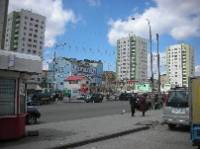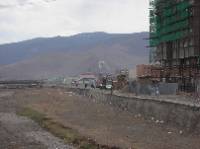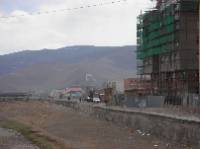Profile
Blog
Photos
Videos
This morning I slept in a bit since I didn't have to get to the ambulances until 3 pm. I would be working the late shift tonight in the city. A quick snack, a little walk around, and off I went once again. Today I decided I'd walk to the clinic, where I'd meet Dr. Gantulga, because there was an enormous amount of traffic due to the Russian celebrations of the victory of WWII. In the main square, Sukhbaatar, there were lots of military vehicles and bands playing. The streets were absolutely packed with cars and there was a concurrent city-wide party for all the graduating high school kids. Everyone was wearing their best clothes and balloons hung from the mini-buses that were driving people around.
When I finally met up with Dr. Gantulga, we headed off to the Emergency Centre where I'd meet the doctor I'd be riding with. She was a young doctor, maybe 24 or so, who had graduated in 2004. She had worked in the Emergency Centre for a year now but didn't like the work that much because of the 24 hour shifts. They work 24 hours on, then 72 hours off. We were in an old Russian ambulance that look like something out of the 60s. It was a hearse-shaped vehicle but of course white. There was barely room sit up straight and there was no rolling stretcher, only one you carried by hand. The equipment was minimal, and seldom actually used. It consisted of a medication tin, loaded with adrenaline (heart attacks), caffeine (wasn't clear what for, but apparently for bleeding and heart attacks), furosemide (diuretic), lignocaine (anti-arrhythmic), droperidol (anti-hypertensive), and a few others I hadn't heard of. There were no IV drips, only syringes and needles so medications were injected directly into the veins. There was no such thing as "fluid replacement" with normal saline or anything else. The airway kit consisted of suction (electric - I doubt it was charged), an ambu bag for artificial ventilations (no oxygen available), and a blanket for birthing babies. There were no splints or anything of the sort.
Our first call was out to a gher village where a woman had been having diarrhoea for 3 days and was just feeling rotten. She was dehydrated and hadn't been eating either. She had a large scar on her abdomen from a previous complication (peritonitis after appendicitis) but that didn't appear to be an issue here. The entire family was gathered around her. We were immediately offered seats around the patient and every word was listened to with great attention. She was "prescribed" something called Diarex on a piece of scrap paper torn from a larger sheet. Some Mongolian instructions were briefly scribbled down and we quickly departed. She was basically told to drink more water and take this medication, apparently from a plant in the Himalayas.
On the next call, we went to a well-appointed house where a man who was very intoxicated was surrounded by his brothers and parents (I think). He had been drinking for three days straight and was simply very drunk. He was told to drink more water and eat some food. Nothing was mentioned about thiamine, folic acid, or anything else of the sort. While there, I was promptly offered a biscuit, which from reading books about Mongolia, I had to accept and immediately eat a piece of it. So there I stood in front of a very drunk man, the only white person within miles, with a giant half-eaten crumbly cookie in my hand. I felt very out of place. I put the rest in my large pocket of the white coat I was told I had to wear as a "doctor" on the ambulance. I ate the rest on the way to the next call, and I was actually quite thankful because I hadn't eaten in a while.
Night had now fallen and the streets were quite dark, especially in the narrow alleyways of the gher villages. Each gher is surrounded by a wooden fence, usually to keep dogs in or out more than for any sort of property boundary. Every so often, where a gher might sit would be a large heap of trash that was designated as the local dump. Our next call was in a darkened gher where the only light was by candle. A woman had been coughing up large amounts of phlegm for several days and wheezes were audible without a stethoscope. She had no fever, perhaps indicative of pneumonia, nor any cardiac symptoms, indicating that the wheeze was from fluid in her lungs. Each person has a standard medical books where each doctor encounter is recorded. A quick review of her record showed she had been diagnosed with lung cancer about 4 months ago. However, the patient was unaware of her illness but the rest of her family knew. Before we had entered the gher, one of the family members had told the doctor about this and told her not to say anything to the patient. We left this patient with some basic supportive care instructions and she was none the wiser as to the fact that she was dying. We had offered to take her to hospital for a chest x-ray but she declined.
The next call was to yet another gher village. In UB, all the addresses are incredibly difficult to interpret, even for locals. Ambulances simply do not know where to go most of the time so what usually happens is that the ambulance is called to the village and then waits at the post office or police station, where a relative of the sick person will usually arrive in a few minutes. Often they have to run for several kilometers to get to the meeting point with the ambulance. The relative then guides the ambulance to the correct location. In this gher, we had a very old woman who was suffering from cardiac failure. She had been in hospital a month ago but this time was worse. She could barely breath, her blood pressure had dropped, and her heart was racing. During the examination, I couldn't help noticing the giant dead, skinned, and drying pig right next to me. This was to be the family's food for quite some time. After a short examination (but no treatment at all), we took her to the hospital where she was placed in queue behind one other person at a district hospital. I'm doubtful she will make it home this time.
And so the calls continued. A man who was one week post-operative developing a entero-cutaneous (gut to skin) fistula (opening). A woman with severe hypertension (280/140) - she was given droperidol before we left her at home). A woman who had premature rupture of membranes after a fall down some stairs (highly suspicious since stairs are very rare here). We really weren't an ambulance service but more a rapid GP clinic on wheels and the occasional taxi. I also happened to notice that all calls came in as only one of two things - seizures (includes feeling unwell, diarrhoea, fever, dehydration, etc) or hypertension (anything else - cardiac, abdo pain). I tried to ask the doctor what symptoms were actually described to dispatch to have the call listed as "hypertension" but was met with a perplexed look. I never did get what these symptoms were.
So my night finally ended at 1 am when the ambulance dropped me off at the guest house. It was a busy but unfulfilling night, as I felt so much more could have been done for these patients even with the limited supplies. On the other hand, the hospitals are already overcrowded and transporting even some of these serious patients requires balancing the risk of just staying at home and the risk of actually being in hospital. It was certainly a big eye-opener. The doctor I was with was very nice, patient, and she put in a lot of work. I can't imagine how hard it would be to be taught all the "right" things to do only to be put into a medical system that doesn't allow this. Your entire career would be one of constantly trying to find the next-best alternative for the medically preferred treatment.
When I arrived home I found that three new Russian house guests had been partying hard all night in celebration of the WWII victory over Nazi Germany. They had since turned in to bed but one of the ladies managing the place ws left to sweep up the floor. I washed up some of the party's s dishes after making some couscous for dinner, then turned in.
Anyway, I'm off the call Michelle (once again waking her up at 3 am!) to say a quick hello.
G'night
- comments











Zaki there is nothing like the peace and quiet of being in the winderless-no cars, no noise. Your senses come alive. You really experience true peace in the winderless away from society.